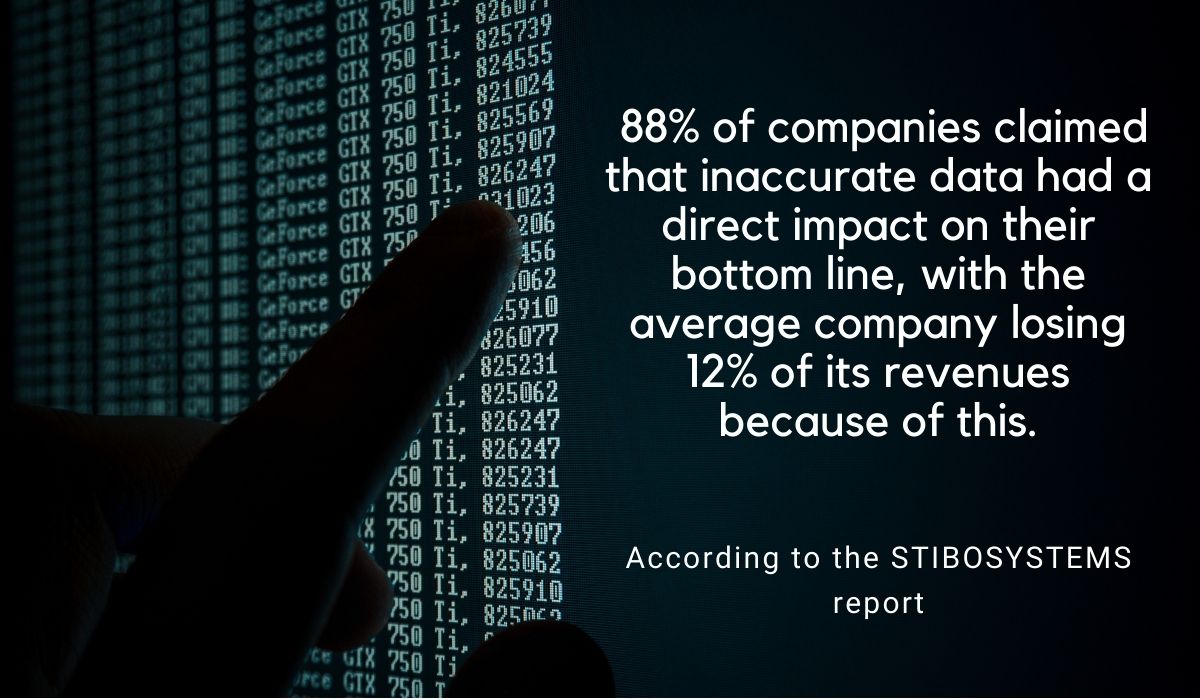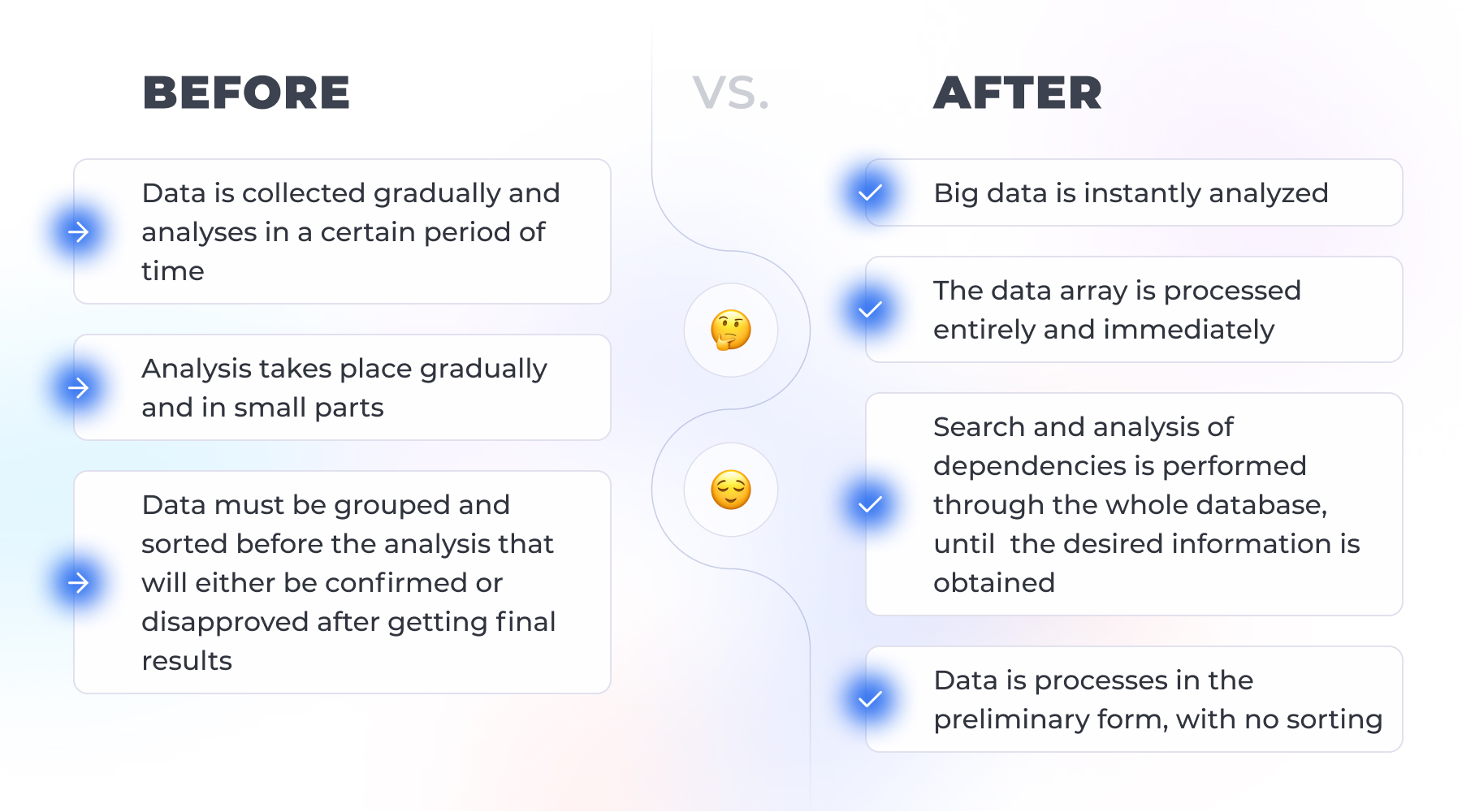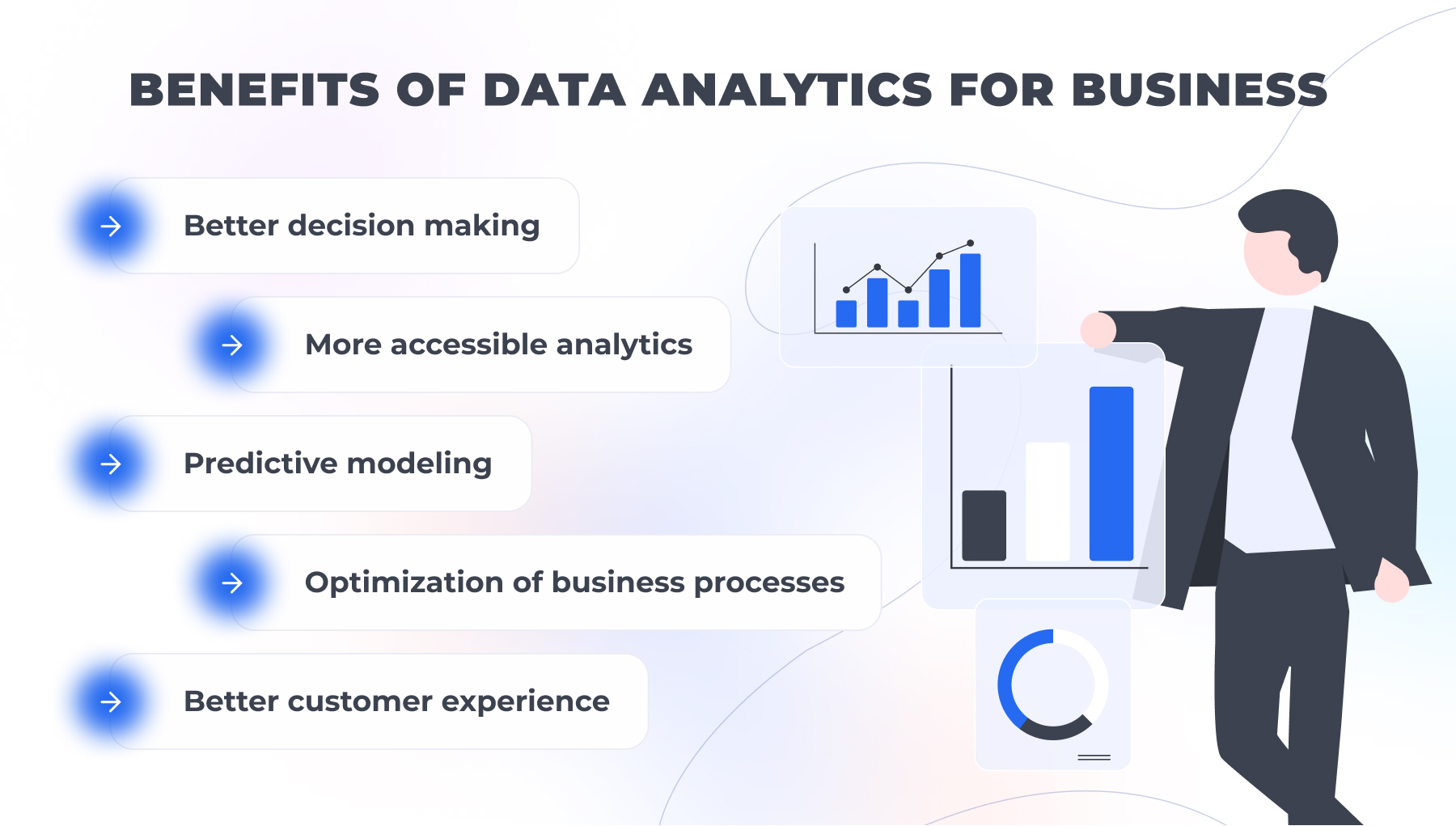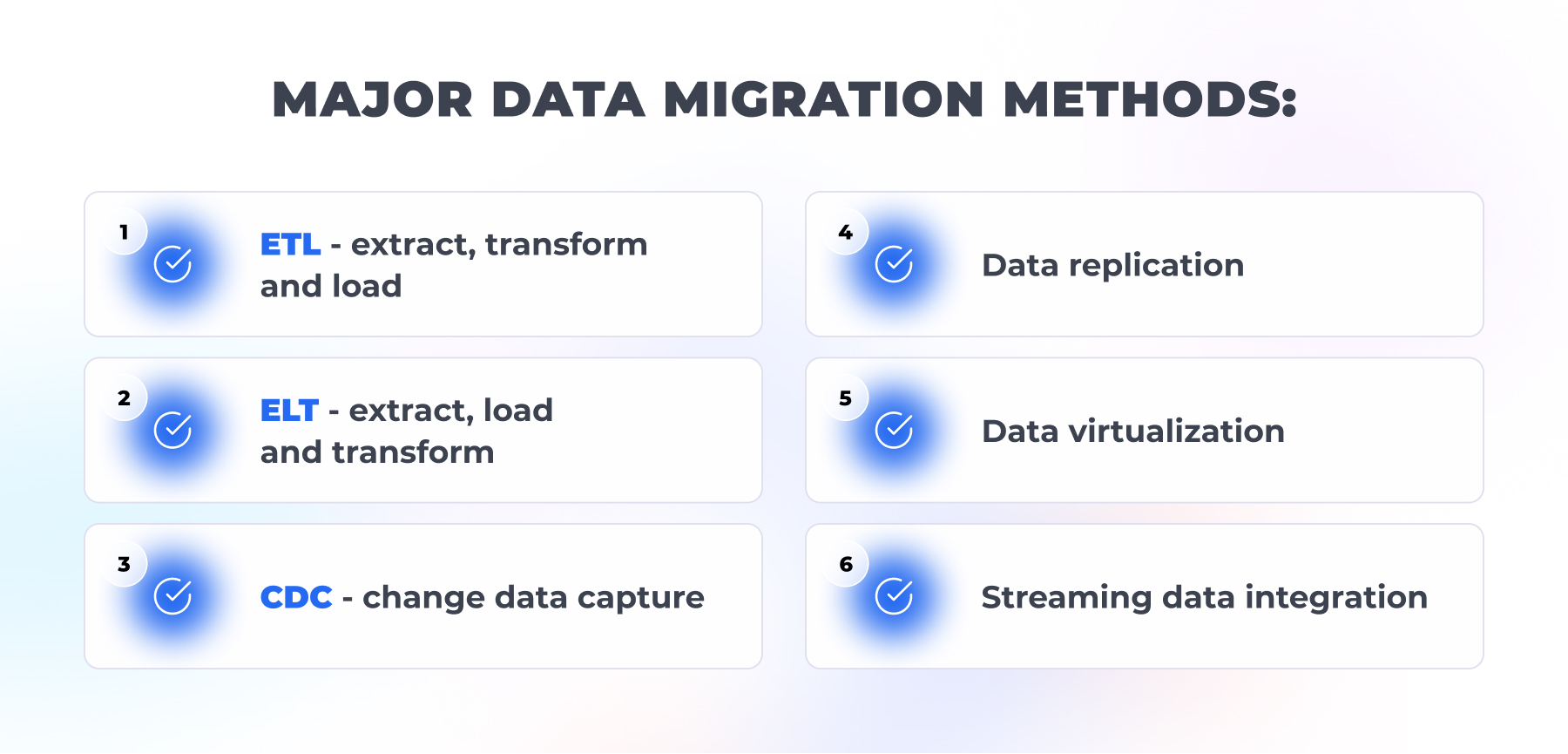Table of Contents
Many organizations see data acquisition and management as just additional expenses. For sure, data capturing, analysis, and modeling need costs and companies are focusing on the price tags, often overlooking the real benefits and the fact that data is a positive asset for any company in optimizing the work with customers, raising the sales rates, income and building business sustainability.
Setting up a data-driven business decision-making model is the surest way to gaining the needed visibility, allowing one to change your business for the better, improve customer service, increase sales and advance your marketing strategies.
In this article, we are going to tackle issues such as the essence of data processing software, the notion of big data and its benefits for businesses as well as ways to successfully integrate big data to give your business additional value.
Data processing software is a valuable “raw material” for your business
Data, to put it simply, is the information you receive from your customers, and it allows you to evaluate the ins and outs of your company’s customer base. Unlike other, perishable, finite, limited resources that run out sooner or later, the more data you use – the more you’ll have. Appropriate organization of data unties your hands, creating more possibilities by giving you more all-important insights. Combined with additional resources, data turns into a powerful asset for your business, allowing you to draw conclusions from tracking customer service data, performance and make your business more data-driven.
Big data helps businesses enhance all their internal operations, enhance customer service, improve marketing campaigns and, along the line help its profits. Watch the video below to get a better understanding of big data, its essence and the real value that gathering and processing big data can add to your business.
It is of utmost importance for entrepreneurs to reassess the role of data and start perceiving it as a powerful instrument assisting in accurate forecasting, efficient risk reduction as well as ability to increase performance and improve overall business through adapting a customer-centric approach.
However, data is of no use if you simply gather it. The real benefit comes when you process it. And this is exactly what you need to go the extra mile for in digitizing your company processes and building a client-oriented strategy based on the insights extracted from constantly updated data.
Appropriate data structuring allows uncovering important lessons and making useful adjustments to your business. As a result of which, once again, business owners can reveal the strengths and weaknesses in customer service data management, turning it into a valuable basis for enhancing their competitive position on the market.
Data has become the competitive differentiator, and it’s become even more apparent in the time of COVID.
David Mariani, founder, and CTO of data virtualization platform provider AtScale.
Aiming to achieve smooth data management and customer asset management, companies need to build the necessary technological infrastructure to have their data yield the maximum possible value. A good solution is to build powerful analytical tools that enable utilizing sophisticated data techniques.
Altamira has been delivering analytical business tools for many years and the number of companies requesting such solutions increases every year. We help customers review the available analytical tools as well as analyze the approach to data processing. We assist in choosing the most suitable software tools which will help properly store and process data, providing instant access to the needed information. It is extremely important for businesses of various scales, and if yours is still facing the big data challenge – you need to schedule a consultation with us ASAP.
A well-chosen data platform helps be smart and strategic about where you direct your budget. It helps to:
-find streamlined ways to efficient management of datasets
-improve the data acquisition process
-compile standardized data sets from data catalogs
-ensure accessibility and accuracy
-remove the inconsistent data
-increase data value through feature engineering
Accurate data allows businesses to improve marketing, sales rates, and customer service. Inaccurate data does not allow access to all the business-critical points, and it results in low quality of service and considerable money losses. Poor data management increases expenses, while appropriate and solid data processing is extremely profitable.
How Much Data is Already Big Data?
Although the concept of big data is relatively new, it has gained tremendous popularity among business owners due to its value and wide applicability. The rise of IoT technology to popularity enabled it to connect more devices to the Internet, creating a network effect, and thus gathering data to track customer service quality and usage patterns. The emergence of Machine Learning technology meant processing even bigger volumes of data. However, cloud computing has expanded the volumes of data to a whole new level with its elastic scalability.
Big data comprises structured and unstructured data collected by companies that are used in machine learning and advanced analytics applications. Big data science allows extracting insights able to help in rebuilding marketing strategies, enhancing advertising and promotions, raising the quality of customer service and engagement and conversion rates.
How can big data applications help your business:
Big Data helps obtain new, previously unavailable information and gives better insight and understanding of the current situation if processed and done correctly. See the scheme below to evaluate the real difference between the latest, most modern big data processing model as compared to the old model.
Who will benefit from gathering and processing data
Data supports many business activities and initiatives and is actually an indispensable part of business digitalization. It helps identify customer service metrics for improvement, better understand business needs. Streamline service, improve communication and marketing as improves customer asset management. Here is the list of benefits big data provides for each industry:
Retail
Macy’s adjusts prices in near real-time for about 73 million product positions it has to sell. All prices are adjusted based on ongoing demand and inventory. The process is handled by an intelligent analytical algorithm developed using data Macy’s has gathered previously. The data includes out-of-stock rates, sell-through rates, price promotions, etc.
Nordstrom has made an even deeper dive into Big Data. The company has collected user’s movement data by processing Wi-Fi signals in one of its stores. The acquired data was later processed to reveal actual shopping trends and personalize ads.
HoReCa
Even if you’re gathering data and keeping track of visitors’ taste preferences, there is a problem to spot certain groups of customers. For instance, customers dining with children. Even when a visitor joins your loyalty program, it’s difficult to know that he/she has children.
Paytronics has used Hadoop data to identify these groups of customers by their activity footprint. Those visitors are dining in groups early and ordering children’s entrees, Shirley Temples, or milk. From here your restaurant manager can target customers with specific discounts, free desserts, and make dedicated dishes for children.
Fintech
Fintech often uses data to analyze applications to define a Default Probability rate, or, in other words, the likelihood of going under. For instance, the word “business” is associated with a higher probability of default. Thus, when someone is borrowing to fund a small business it is more likely that this loan is bad, i.e. will be defaulted on. On the other hand, when someone is filing for consolidation of a credit card, then it is more likely to be a good loan.
The same method can be used to process the employer description field to get a Default Probability Score. For instance, giving a loan to an unemployed person is not much better than loaning to any person who walks into the bank branch. But if a person works in a university or city then he/she has a lower Default Probability.
Having a good data analytics team in the back office serving as a kind of support for your bank customer relationship team can be a huge strength. Especially if you just rejected a loan application and your client needs to get an intelligent, justified answer as to why. The kind of answer that will be based on cold facts, rather than equivocal phrases. If you’re doing portfolio management you may want to risk-allocate client portfolios based on their risk profiles/appetites.
Altamira team has gained extensive practical experience while working on numerous fintech projects. Our expert from the development department has shared his point of view concerning the risks of big data usage and challenges.
Challenges:
- relatively costly infrastructure and machine time;
- difficulties related to the integration of big data processing as well as outdated business processes and systems.
Risks:
- no security risks;
- financial – the impactfulness of big data usage should be confirmable since it’s costly and should be worth the investment by bringing considerable profit;
- speed – big data processing is really time-consuming, which is especially pressing when the time of business owners is incredibly valuable and strictly limited.
Energy Production
As the world is getting more conscious about energy sources it becomes more clever and diverse in using energy resources. But new problems will always arise, attention is now turning to the renewable energy industry.
For instance, electric cars have a flip side in that the creation of lithium-ion batteries is bad for the environment; solar panels tend to depreciate and degrade over time. But, machine learning algorithms can be a solution, at least in part, since they can, for instance, identify which solar cells need to get maintenance work in the first place. In this particular case it will most likely be those that are in the center of a solar plant, because they are less exposed to the wind flow and tend to heat up more.
How to start integrating big data
The gathered big data is often stored in data lakes. For example, data warehouses are usually built on relational databases, comprising structural pieces of information. In contrast, data lakes support various types of databases, including cloud services and big data platforms. The variety of big data environments demands combining multiple systems and distributed architectures. It is possible either to store data in a raw form or to apply it depending on the particular analytical tool. Otherwise, you need to use data mining or data preparation tools. Then you move to data migration. Here are the major data migration methods.
Big data processing requires a computed infrastructure, which is usually provided by clustered systems that distribute processing workload. The most widespread technologies include Hadoop and the Spark processing engines. However, to make the data processing more cost-effective, data is mostly located and stored in the cloud platforms. In case, you choose cloud, you get the centralized infrastructure allowing to implement new technologies.
In terms of data processing, the most efficient tool is an AI-powered solution. It enables using data as a strategic tool to get valid strategic results. Data processing involves profiling, cleansing, validation, and transformation of data sets. Here is the list of tools enabling data management:
| Storage repositories | Amazon Simple Storage Service (S3), Google Cloud Storage, and Azure Blob Storage |
| Cluster management frameworks | Kubernetes, Mesos, and YARN |
| Stream processing engines | Flink, Hudi, Kafka, Samza, Storm and the Spark |
| NoSQL databases | Cassandra, Couchbase, CouchDB, HBase, MarkLogic Data Hub, MongoDB, Neo4j, Redis |
| Data lake and data warehouse platforms | Amazon Redshift, Delta Lake, Google BigQuery, Kylin, and Snowflake |
| SQL query engines | Drill, Hive, Impala, Presto and Trino |
To make the right decisions you need to have the support of advanced software architects and engineers. The Altamira team will help you with the Data Intelligence integration. Based on extensive experience in building the technology, our experts have a deep understanding of AI initiatives and comprehensive data management. Our experts apply AI technology in various forms including machine learning (ML) of different types – supervised, reinforced, semi-supervised. In case your data storage systems are outdated, our experts can help with code refactoring and reviewing.
Big data implementation challenges
Many companies get stuck in the initial stages of big data implementation. The major reason is that they are not aware of the major challenges and possible pitfalls this process entails. The process of integrating big data volumes is rather complicated. Major difficulties include: uncertainty of data, management, syncing across data sources, finding insights, and skill availability. Here are the most common big data challenges that companies face while integrating data by themselves:
- Lack of big data understanding – as is often the case, companies are not fully aware of storage, processing, the importance of big data, and its basic concepts.
- Rapid growth in data volumes. New data is being generated every second and huge amounts of data continue growing and are difficult to manage.
- Selection of the right tools for sufficient data management.
- Lack of data experts.
- Data security – data encryption, segregation, real-time monitoring, implementation of big data security tools.
- Making data from various platforms and storage accessible.
- Choosing suitable data management tools and strategies.
Moreover, big data applications should be fully aligned with and support the company’s needs and objectives. It also requires the availability of customized tools and services as well as solid tech support from technology experts. With no central planning for data movement and integration, a company will face an overwhelming and unmanageable number of interfaces. If you want to get a positive return on your investment in technology, complement and extend your company’s data capabilities opportunities once and for all, trust Altamira to do the job:
- We offer redesign and modernization of existing business technology solutions;
- Our BA defines the best possible courses of action based on your desired list of features for the solution, picking out the most suitable technology stack to use through the discovery stage;
- We have rich domain knowledge, the experience of working as a dedicated team contributing to global project development;
- Altamira engineers will build custom cloud-based big data solutions, data science software, ML algorithms for data collection, storing, capturing, and processing;
- We offer extensive expertise in architecture design, cloud-based solutions, data science solutions.
The average development cost of the project may comprise 85k – 113k USD and it may vary depending on the needs of the client. Take into consideration that the benefits your company will get will more than pay off the investment you’ve made. Think of it as a good, solid long-term investment. Data management technologies help overcome all of the above-mentioned challenges and offer the following benefits:
- Better consistency;
- The rapid growth of customer loyalty;
- Increased productivity;
- Effective marketing strategies;
- Providing a quantitative and qualitative view of your business.
Upgrade your CRM system to a new level thanks to Big Data
A CRM-system can benefit almost any organizational unit – from sales and customer service to recruitment, marketing, and business development. Storing all customer information in one place, registering service issues, identifying sales opportunities, managing marketing campaigns – these are just a few of the opportunities granted by a CRM.
While managing CRM systems, companies usually rely on people, processes, and technology. As it is often the case, CRM systems fail to satisfy the company’s needs since CRMs were intended to manage relationships with clients. Big Data CRM exceeds the old limits/boundaries, aiming to provide high-quality service for customers. Here are possible reasons why your CRM system may fail:
- CRM is a part of the single deal;
- Lack of high-quality data, its upgrading fails;
- A company doesn’t have properly defined technology objectives, resulting in a faulty system and inappropriate data collection and storage;
- Lack of solid tech support for the CRM project. All too often, CRM projects end up being led by IT departments who are not equipped.
Altamira can take your CRM to the next level and bring additional value to your company by building AI-powered solutions enabling you to:
- Build the appropriate algorithms to perform better analysis and provide high-quality customer service;
- Uncover new dataset patterns and extract using mixed dataset approaches;
- Analyze customers’ feedback to be able to rapidly react and move around the critical issues;
- Marketing analysis, which will result in optimization of marketing decisions;
- Analyze the recommendations to provide the best possible advisory out of all available recommendations and increase conversion rates.
One of the bright examples of a CRM system we have built is Inflight. This is a CRM system developed to let users manage orders (catering for aircraft). The company dealt with a tremendous number of orders and needed the CRM system to optimize its work. Our team has built and successfully integrated the CRM system that enhanced the company’s order management and allowed driving customer service to a new level with the support of sustainable technology.
Summary
The rapid rise of business digital transformation has highlighted the importance of data Intelligence integration and management. Big data agility is a considerable business advantage that expands the scope of possibilities, drives competitive advertising, and shows a full-scale view of the entire company performance.
The leverage of big data analytics powered by AI will allow you to get actionable insights and enhance the customer experience by upgrading your CRM systems. Most companies do not have an elaborate strategy and tools in place for proper data management. As a result, traditional big data integration is impossible without tools and engineering talent to adjust and handle big volumes of unstructured data and turn it into a considerable business advantage.







